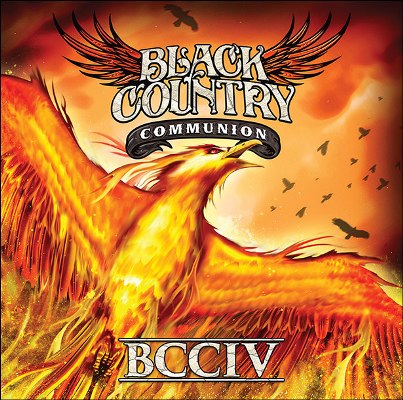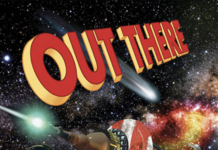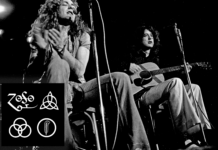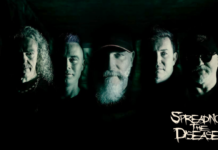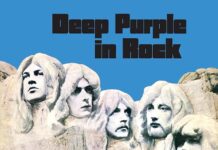Time waits for no man it knows things go round in circles. Wait long enough and those missed opportunities might not feel like lost causes any more. In the entertainment business if you wear yourself ragged, stopping having hits films, records or books but stash enough away to hideaway out in oblivion the call may come in redefining you as a living legend. Thereafter the powers that be can put out a box set of your greatest works and may even have you put in a cheesy-grinned TV chat show appearance to reignite your career for a while.
Fortunately the members of Black Country Communion have each had busy professional careers while the brand itself was put to pasture. Disparate entities whose names on paper you wouldn’t necessarily put together collectively they surprised us by actually delivering the goods more often than not. Named after the hallowed Midlands smog land where two of them had their ancestral roots (though presumably not trademark in the name).
Their first album ticked the box for classic rock fans, sounding like all those giants who once strode the earth back when rock was young, virile and swung its golden locks proudly rather than flashing its tattoos. And what was great was that the songs they made didn’t sound dated and the best ones took on another colossus form of life when played live. BCCII was a successful follow up but far too many regurgitated Zeppelin riffs variations for these tastes. The third offering, Afterglow; did anyone actually give it the time of day it deserved? The band had practically imploded before it came out. The reason not being that tired musical differences excuses but the reality that ongoing individual career trajectory patterns were not harmony (while spreadsheet projections for the band looked good individual commitments and long term pension plans couldn’t be adjusted to accommodate the situation). A shame, Afterglow, had them grooving musically. Shift forward to last year. The entertainment business current belief is that long-term success is based on one’s current media profile.
Bass player/vocalist Glenn Hughes’s involvement in vagabond touring super group/covers band Kings Of Chaos found him wiping the floor vocally with guys half his age, then his involvement with Deep Purple received recognition as they were finally entered into the USA’s Rock & Roll Hall of Fame. The upshot? He and guitarist Joe Bonamassa do dinner, the BCC band reforms. The cynics among us raise a quizzical eyebrow, while counsellors declare talking face to face is the key to finding peace and harmony, me I say let the music do the talking. And, fortunately, BCCIV is not just exceptional musicians dialling in professionally crafted sounds, it’s a band listening to each other and growing musically too. That’s not to say everything is out of this world fantastic, baby, but what has been achieved certainly needs evaluating, then playing again some.
First out the paddocks is an archetypical slice of Black Country Communion if ever there was one in ‘Collide’ and no doubt the reason it got released early as a single. While the riff drives the song through its paces it’s Jason Bonham’s drumming that draws your attention, well right up to the point Bonamassa dons a pair of Jimmy Page-sized gloves and crushes a wonderfully warped effects laden guitar solo. It’s followed by ‘Over My Head’ and its slow blues funk opening will have those less fond of Hughes’ r’n’b-overtures curling their toes but play it loud and dig the crunch, and frankly if anything it’s how the song fans outwards with a latterday heavy Beatles feel that’s more where the singer’s coming from these days. The vocal harmonies produce a nice change in style, but what’s most interesting are the progressive instrumental sections – the album is littered with them taking the band in interesting directions; it is exciting and melodious, demonstrating their ability to stretch out while still communicating musically between each other.
So, what of Zeppelin references this time round? There are only two really. ‘Sway’ revamps the ‘Kashmir’ riff to grunge soul given a Michael Jackson/Quincy Jones dance vibe courtesy of Bonham’s drumming whereas it’s Hughes’ voice that gives it the rock edge, and again they go for a proggier-type section within the song. ‘Love Remains’ is an outright lift of ‘The Wanton Song’ and once you’ve got over the sheer audacity of that the added Rainbow affectations and a prolonged chorus vocal as Hughes reflects on the recent passing of his parents renders it both one of the album’s strongest heavy hitters and more emotionally profound. ‘Awake’ slips in rather sweetly and quite beautifully straight after. This is funk fusion that gets progressively heavy and freakier. It’s more like The Ian Gillan Band with its harmony vocals and some fantastic playing between the band members and maybe not for everyone, but was for me.
Taking roads less often travelled we also have ‘The Last Song for My Resting Place’ and ‘The Cove’, the former a Bonamassa sung opus, the latter where Hughes outlines the plight of dolphins being killed in Japan. Tree-hugging worthiness rarely translates well into the rock vernacular and I was wary of being preached at by Cannock’s favourite son. Fortunately the music is suitably atmospheric. There’s an early psychedelic Sabbath doom laden feel that partially dissolves while sinking deeper, exploring depths of minimalism and creativity. Bonamassa’s guitar thrusts and wails, while Derek Sherinian adds suitably scary piano sections – Indeed the former Dream Theater keyboard player’s enhancements throughout are a formidable ingredient on the record, sometimes subtle but ever present.
‘The Last Song for My Resting Place’ is about violinist Wallace Hartley who played on as The Titanic went down. Acoustic guitar and a guest violinist have this coming across as something inspired by Bonamassa’s recent Live at Carnegie Hall album but it fails to draw me in; his voice lacking emotional range and it being far too long. Its saving grace is where the band plug in just before the four minute mark and Bonamassa himself cuts through soloing powerfully. Back in the good old days we’d have just dropped the needle straight to that section… Lucky, you, there’s a vinyl edition available to do just that.
Aside from the odd string swoop along the fretboard, Hughes’ bass rarely gets any action, the exception being ‘The Crow’. From a distant echo the four strings rumble forth becoming chunky and profound, Bonamassa applying the riff to good measure on six string; they veer into a Purple-style middle eight given an Iommi/Hughes gruffness, then take off in a wonderfully progressive Red-era King Crimson vein while keeping it a head banger affair before each taking a brief solo before returning to the main theme.
‘Wanderlust’ is both blue collar rock with Bad Company style chord progressions and a more metaphorical spiritual journey as it gets trippy in a psychedelic manner. About four minutes in they cut the song down to half time and groove collectively before crashing back into the song’s conclusion. The album ends with ‘When The Morning Comes’ that echoes Heartbreaker-era Free with a variation on the instrumental section of Purple’s ‘Gypsy’, shifting between subtle interplay and power chord drama to become a humongous and glorious beast that infers if not outright declares that testosterone is being put to good use and the four members of Black Country Communion know what they are capable of collectively.
More than the sum of their parts, and more than what they were first time around – The sheer joy in musical interplay on BCCIV is felt by the listener. If we are to be rationed and only get to hear this band as time, circumstances and managements decree it, then so be it. These guys do rather good work together.

